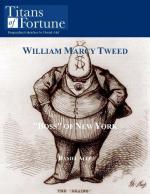|
This section contains 280 words (approx. 1 page at 300 words per page) |
World of Criminal Justice on William Marcy Tweed
William Marcy Tweed, known as Boss Tweed, was the leader of the New York City Democratic Party organization known as Tammany Hall during the 1860s and early 1870s. Under his leadership, Tammany politicians acted corruptly, embezzling public funds, and using their positions for other forms of personal gain. Tweed was eventually convicted of his crimes but the Tammany organization survived.
Tweed was born on April 23, 1823, in New York City. As a young man he learned the trade of chair maker, but he soon devoted all his energies to politics. He was elected a New York City alderman in 1852 and was reelected the following year. He was elected to the U.S. House of Representatives in 1853, but he was defeated for reelection. Tweed then shifted his focus to local politics. He was elected school commissioner in 1856 and in 1858 became a member of the board of supervisors for New York County. Tweed became deputy street commissioner in 1861 and held that office until 1870. He was elected to the state senate in1867 and was reelected in 1869 and 1871.
During the late 1850s and the 1860s, Tweed became a master of political corruption. His motto was "something for everyone,"and he used that philosophy to corrupt newspaper reporters and to persuade union officials and Catholic Church officials to go along with his plans for civic improvement. He used construction projects and other city programs as sources of money for himself and Tammany Hall cronies.
Tweed was convicted in 1874 on charges of official embezzlement and sentenced to 12 years in prison. He escaped from prison in 1875 and was captured in Spain. He was imprisoned again in 1876. He died in a New York City prison on April 12, 1878.
|
This section contains 280 words (approx. 1 page at 300 words per page) |


